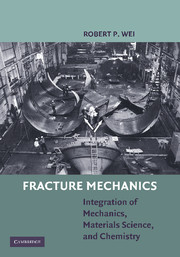Description
Fracture Mechanics
Integration of Mechanics, Materials Science and Chemistry
Author: Wei Robert P.
This text integrates fracture mechanics, surface and electrochemistry, materials science, probability and statistics to address fracture safety and durability issues.
Language: English
Subject for Fracture Mechanics:
Approximative price 77.67 €
In Print (Delivery period: 14 days).
Add to cart
Fracture Mechanics
Publication date: 01-2014
Support: Print on demand
Publication date: 01-2014
Support: Print on demand
Approximative price 71.14 €
In Print (Delivery period: 14 days).
Add to cart
Fracture mechanics: integration of mechanics, materials science and chemistry
Publication date: 02-2010
230 p. · 18.4x26.2 cm · Hardback
Publication date: 02-2010
230 p. · 18.4x26.2 cm · Hardback
Description
/li>Contents
/li>Biography
/li>
Fracture and 'slow' crack growth reflect the response of a material (i.e. its microstructure) to the conjoint actions of mechanical and chemical driving forces and are affected by temperature. There is therefore a need for quantitative understanding and modeling of the influences of chemical and thermal environments and of microstructure, in terms of the key internal and external variables, and for their incorporation into design and probabilistic implications. This text, which the author has used in a fracture mechanics course for advanced undergraduate and graduate students, is based on the work of the author's Lehigh University team whose integrative research combined fracture mechanics, surface and electrochemistry, materials science, and probability and statistics to address a range of fracture safety and durability issues on aluminum, ferrous, nickel, and titanium alloys and ceramics. Examples are included to highlight the approach and applicability of the findings in practical durability and reliability problems.
1. Introduction; 2. Physical basis of fracture mechanics; 3. Stress analysis of cracks; 4. Experimental determination of fracture toughness; 5. Fracture considerations for design; 6. Subcritical crack growth - creep controlled crack growth; 7. Subcritical crack growth - stress corrosion cracking and fatigue crack growth (phenomenology); 8. Subcritical crack growth - environmentally enhanced crack growth under sustained loads (or stress corrosion cracking); 9. Subcritical crack growth - environmentally assisted fatigue crack growth (or corrosion fatigue); 10. Science-based probability modeling and life-cycle engineering and management.
Robert P. Wei is the Reinhold Professor of Mechanical Engineering and Mechanics at Lehigh University. His principal research is in fracture mechanics, including chemical, microstructural, and mechanical considerations of stress corrosion cracking, fatigue, and corrosion, and on life-cycle engineering. He is the author of hundreds of referred research publications. He is a Fellow of the American Society for Testing and Materials, the American Society of Metals International, and the American Institute of Mining, Metallurgical, and Petroleum Engineering and a member of Sigma Xi and the Phi Beta Delta International Honor Societies.
© 2024 LAVOISIER S.A.S.




